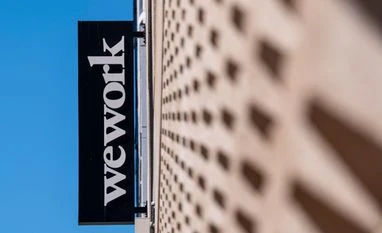By Amelia Pollard, Ellen Huet and Ethan M Steinberg
Just two years after it went public, the once high-flying real estate business WeWork Inc. filed for bankruptcy without ever having figured out how to make flexible workspaces into a profitable enterprise.
It caps a wild ride for a company that began with the idea of re-imagining staid offices as fun places to hang out and grew to a behemoth worth $47 billion at its peak. A botched 2019 initial public offering and erratic behavior by co-founder Adam Neumann started WeWork’s downfall, but the company was also battered by forces outside its control — Covid-19 lockdowns and a slow return to offices that undermined demand.
The company listed $19 billion of liabilities and $15 billion of assets in its Chapter 11 filing in New Jersey on Monday. The petition allows WeWork to continue operating as it works to shore up finances. The company said it reached a restructuring deal with longtime backer SoftBank Group Corp. and existing creditors to slash over $3 billion of debt. Most shareholders will be wiped out. It never turned a profit as a public company, reporting net losses that totaled $3 billion.
Bankruptcy will also, critically, allow WeWork to cancel or renegotiate unprofitable leases at more than 60 North American locations to start, Chief Executive Officer David Tolley said in court papers. Its real estate footprint sprawled across 777 sites in 39 countries as of June 30.
“Going into bankruptcy — a Chapter 11 like this – is like open heart surgery,” said Isaac Marcushamer, a partner and bankruptcy lawyer at DGIM Law. “With the right doctors and surgeons, there’s a chance of success. But it’s not risk-free, and every aspect of the company is going to be touched.”
Also Read
WeWork was for a time a darling of Wall Street and Silicon Valley alike, with investors in awe of a charismatic founder who vowed to remake how white-collar professionals worked and build “community” in the process. Instead of boring cubicles surrounded by beige walls, Neumann’s firm promised a fun space to spend time with colleagues, with beer on tap, ping-pong tables and plenty of cushy hang-out spaces for dreaming up the next big thing. In the process, it voraciously snapped up office space around the world, at one point becoming the largest private-sector tenant in cities including New York and London.
WeWork was never a conventional business — for a portion of its existence, it operated with a stated mission to “elevate the world’s consciousness.” But the spiritual ethos, along with high-profile marijuana and tequila consumption by Neumann, didn’t always seem compatible with actually making money. In a matter of months in 2019, the company went from planning an IPO to laying off thousands and procuring a multi-billion-dollar bailout from SoftBank, whose reputation suffered amid bad bets on WeWork and other high-flying tech names.
Neumann stepped down from the top job days before WeWork had to scrap the IPO plan, and more conventional managers with traditional finance experience were brought in. The company eventually went public in 2021 through a combination with a special purpose acquisition company. But that didn’t stop WeWork from hemorrhaging cash.
While WeWork reached a sweeping debt restructuring deal in early 2023, it quickly fell into trouble again. In August, it said that there was “substantial doubt” about its ability to continue operating. Now, the company has struck a restructuring agreement with creditors representing roughly 92% of its secured notes, and plans to “streamline” its rental portfolio of office space, it said in a statement.
Other shared office-space firms have also stumbled after the pandemic upended working habits. Knotel Inc. and subsidiaries of IWG Plc sought bankruptcy in 2021 and 2020, respectively.
But WeWork always stood out from its competitors, attracting notoriety both for the atmospheres it cultivated at its shared spaces and the intense, hard-partying corporate culture. In the halcyon days, annual summer parties featured canoes full of beer and performances by musical acts including The Weeknd and Florence & the Machine.
The company also sought to expand beyond offices to living spaces, creating two residential apartment buildings called WeLive — “a world where no one feels alone.” One particularly heady venture was WeGrow, a private elementary school housed in WeWork’s Manhattan headquarters that aimed to raise “global citizens” who “understand what their superpowers are.” WeWork also dabbled in a search-engine-optimization company, a superfood startup and a wavepool maker.
All those disparate ventures burned through a ton of cash, and investors balked when the company tried to go public in 2019.
After, the company brought in real estate veteran Sandeep Mathrani to serve as CEO and attempt a turnaround. He sought to cultivate a more conventional atmosphere and corporate balance sheet. He renegotiated leases and oversaw attempts to spin up new products in a desperate bid for profitability, but ultimately couldn’t find a way to make money, especially when WeWork offices emptied out in the early days of the pandemic.
Tolley took over in May and will oversee the restructuring.
The company said it intends to file reorganization proceedings in Canada, though its locations elsewhere are not part of the bankruptcy process. Franchisees around the world are also not affected, and it said it would continue servicing existing members, vendors, partners and other stakeholders as part of ordinary business.
Ermengarde Jabir, a senior economist at Moody’s Analytics, said the company’s downfall stemmed in part from woes that affected all office landlords in the pandemic’s aftermath, but that its unconventional management and operating approach were also factors in its bankruptcy.
“WeWork hasn’t been immune to the office sector’s ongoing woes, but its own management issues can’t be ignored,” Jabir said. “Compared to other co-working space operators, WeWork took a different approach, and it didn’t work.”
The bankruptcy is WeWork Inc., 23-19865, U.S. Bankruptcy Court for the District of New Jersey (Newark).
)